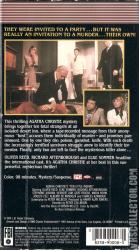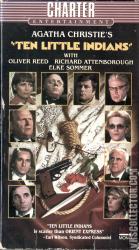Ten Little Indians
Catalog Number
90008
-
Primary Distributor (If not listed, select "OTHER")
Catalog Number
90008
Primary Distributor (If not listed, select "OTHER")
Release Year
Country
N/A (NTSC)
N/A | N/A | N/A
N/A | N/A
And Then There Were None (1975)
Additional Information
Additional Information
Agatha Christie, the greatest mystery-writer. "Ten Little Indians" her greatest mystery.
Based on AGATHA CHRISTIE'S "Ten Little Indians" [UK Theatrical - entitled And Then There Were None]
The who's next whodunnit
They were all invited to a party. But it was really an invitation to a murder- their own.
And Then There Were None (a.k.a. Ten Little Indians) is a 1974 film version of the Agatha Christie mystery novel of the same name. Two previous theatrical adaptations were released in 1945 and 1965, and a videotaped made-for-television version was broadcast in 1959.
This was the second of three versions of Christie's novel to be adapted to the screen by producer Harry Alan Towers; the aforementioned 1965 version, this one was made in 1974, and yet another in 1989. It follows the script of the 1965 version, right down to calling the Oliver Reed character "Hugh" (a name change made to accommodate Hugh O'Brian in the earlier version) instead of "Phillip," which was character's name in the novel and play, though this particular adaptation is set in an abandoned hotel in the Iranian desert; the film was shot in the Shah Abbas Hotel (now known as the Abbasi Hotel) in Iran during its pre-revolution days.
The film's run time is an hour and thirty-eight minutes and it is the first film version of the novel to be filmed in color.
Herbert Lom, who plays Dr. Armstrong here, also starred in the 1989 version as the General.
Both Adolfo Celi and Gert Froebe had already played villains in the James Bond series.
Charles Aznavour was allowed to sing his signature song, The Old Fashioned Way, and the film uses the standard recording of it, which leaves the audience to wonder where the orchestral back-up behind him is coming from.
Orson Welles is heard as the voice of the mystery man "U.N. Owen," though unlike the 1965 version, for which Christopher Lee played "Owen" anonymously, Welles received full screen credit.
In the opening credits, the screenplay is credited only to "Peter Welbeck" (a pseudonym of producer Towers), but the IMDB attributes the script to Welbeck, Erich Krohnke, and Enrique Lovet. The film was directed by Peter Collinson.
Release Date: April 23, 1975
Based on AGATHA CHRISTIE'S "Ten Little Indians" [UK Theatrical - entitled And Then There Were None]
The who's next whodunnit
They were all invited to a party. But it was really an invitation to a murder- their own.
And Then There Were None (a.k.a. Ten Little Indians) is a 1974 film version of the Agatha Christie mystery novel of the same name. Two previous theatrical adaptations were released in 1945 and 1965, and a videotaped made-for-television version was broadcast in 1959.
This was the second of three versions of Christie's novel to be adapted to the screen by producer Harry Alan Towers; the aforementioned 1965 version, this one was made in 1974, and yet another in 1989. It follows the script of the 1965 version, right down to calling the Oliver Reed character "Hugh" (a name change made to accommodate Hugh O'Brian in the earlier version) instead of "Phillip," which was character's name in the novel and play, though this particular adaptation is set in an abandoned hotel in the Iranian desert; the film was shot in the Shah Abbas Hotel (now known as the Abbasi Hotel) in Iran during its pre-revolution days.
The film's run time is an hour and thirty-eight minutes and it is the first film version of the novel to be filmed in color.
Herbert Lom, who plays Dr. Armstrong here, also starred in the 1989 version as the General.
Both Adolfo Celi and Gert Froebe had already played villains in the James Bond series.
Charles Aznavour was allowed to sing his signature song, The Old Fashioned Way, and the film uses the standard recording of it, which leaves the audience to wonder where the orchestral back-up behind him is coming from.
Orson Welles is heard as the voice of the mystery man "U.N. Owen," though unlike the 1965 version, for which Christopher Lee played "Owen" anonymously, Welles received full screen credit.
In the opening credits, the screenplay is credited only to "Peter Welbeck" (a pseudonym of producer Towers), but the IMDB attributes the script to Welbeck, Erich Krohnke, and Enrique Lovet. The film was directed by Peter Collinson.
Release Date: April 23, 1975






Comments0
Login / Register to post comments